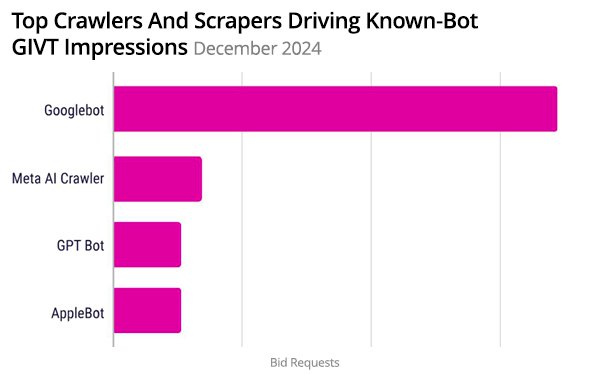
AI-powered crawlers and scrapers drove an 86% increase in
general invalid traffic (GIVT) in 2024, according to new data that demonstrates new challenges for publishers and brands.
GIVT -- bots used for search engine indexing, stress testing, AI
scraping, and similar purposes -- are not typically malicious like sophisticated invalid traffic (SIVT), but can still harm accurate measurement, according to DoubleVerify’s Fraud Lab.
When it comes to media buying, GIVT refers to any clicks or
impressions on an advertisement that are not generated by a real user with an actual interest in the product or the service.
If left unchecked, according to the lab, GIVT can distort metrics,
inflate impression counts, and cause discrepancies. The company said it also has observed a significant spike during the election period, when AI scrapers were particularly active.
advertisement
advertisement
The fourth
quarter of 2024 is also the first time DoubleVerify identified monthly GIVT volumes surpassing 2 billion ad requests. The data shows this growth pattern was sustained throughout H2 2024, when GIVT
rates grew by roughly 70% in December 2024 compared with December 2023.
The technology can inflate traffic metrics by generating impressions that do not represent genuine human
engagement, contributing to the increase in GIVT. DoubleVerify’s data shows 16% of GIVT from known-bot impressions in 2024 was generated by those associated with AI scrapers, such as
GPTBot, ClaudeBot and AppleBot.
DoubleVerify also suggests that GIVT bots are devoted to training AI, such as Meta AI bot and AppleBot, while other crawlers serve a mix of purposes such as
GoogleBot, which represents search and AI.
In December 2024, for GIVT as measured on known-bot impressions, GoogleBot led -- followed by Meta AI Crawler, GPTBot, and AppleBot.
DoubleVerify also tracked “evasive scrapers” disguised as human visitors, but identified based on behavior. False impressions from these scrapers may be categorized as SIVT bot fraud,
often referred to as the Scorpio fraud scheme by the DoubleVerify Fraud Lab.
The SIVT crawlers associated with the Scorpio fraud scheme, and GIVT
crawlers’ activity continued to rise in Q4, showing spikes on major U.S. shopping holidays.
In the case of SIVT bots, such as those in the Scorpio scheme, Retail Media
Networks may also experience traffic impact, as these undeclared bots are more difficult to avoid.
AI-generated email spam has also become a problem for publishers and brands.
Craig McDaniel, founder of Sweepstake Today, which aggregates lists of sweepstakes from across the web, has been the recipient of numerous AI-generated spam emails, and believes that 2025 will
become the year of more phishing email attacks. Many will try to replicate brands and publishers.
“The bad guys are getting smart and using AI will be a game changer in
emailing,” McDaniel wrote in an email to MediaPost. “Google has improved deleting spam in Search, but now the email hosting companies need to step up as well.”
AI has enabled
fraudsters to write and send emails with perfect grammar, generic language and phrasing. Although it has become more difficult to distinguish from a legitimate email, it’s still designed to
deceive the recipient into clicking on malicious phishing links or providing personal information.
McDaniel said the problem becomes whether security seems like an afterthought in URLs
or emails. Companies seem to take little preemptive action.